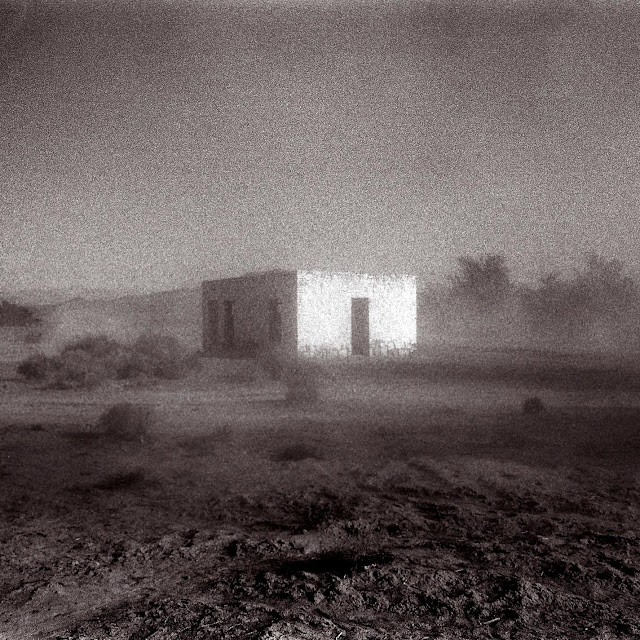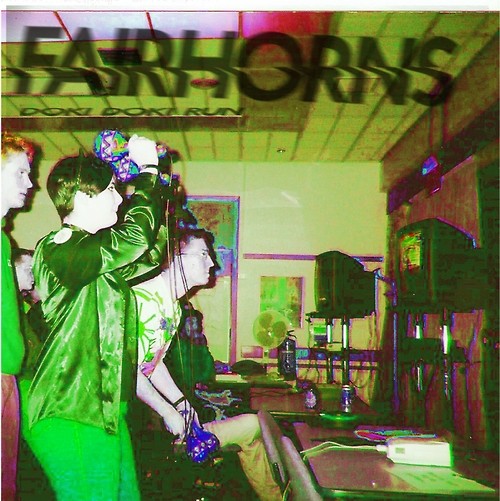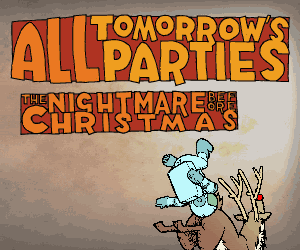
For much of Doki Doki Run is bleeding edge intoxicant; invigorating yet with that utterly disorientating. Markedly introspective yet strangely inviting, as may be a spindly woodland post-gloaming. Loveridge is operating out in the dingy hinterlands of esotericism – absolutely. But as though returning sopping of shoe, fetid of stench, and gruff of voice from either this fictitious sylvan construct of my mind or indeed the equivalently hallucinatory ATP experience, the record is an enticing triumph.
It's quite coincidentally filed alongside Factory Floor in my iTunes, and this serves as an eerily acute comparison for Loveridge has dug his niche somewhere between the calculated, almost mathematical meshes of Krautrock and the rather more loose analog throbs of Colk Void's sonic barbarians. 10-minute opener Ragnarok incidentally resuscitates memories of much of Geoff Barrow's DROKK project also. It may sound noxious, with its breathy vocals processed to a spectral moan and its synthy glitches somewhat erratic, but with that it's most infectious. Compelling as Alex Zhang Hungtai spazzing out on a sofa of soft and obscure synth-pop fuzz, it may be convoluted and quite cruddy around the edges but it makes for a remarkably listenable hunk of propulsive, jump-up punk.
Substantially more eerie than that serendipitous parallel aforesaid is Doki Doki You're Fucking Dead, as an unintelligible groan is triggered ad infinitum, made to stare down the barrel of Liars' electronically infused WIXIW canon for five increasingly trying minutes. Again, Loveridge channels this antagonistic tension into something that somehow remains not only endurable, but also irrefutably enthralling as the shrieking of unidentifiable instruments and squawking of others begins to predominate. Then, four minutes in, the thing opens up as may Fuck Buttons' Olympians or Mogwai's Death Rays. It burgeons in vivid bloom, before swiftly spluttering out into silence as though sensing its author opening up and exposing a little too much. Worried Thrumm thereby serves as a timely counteraction to this creeping impression of Loveridge lightening up as Minehead used to come Monday. For Worried Thrumm is ominously doleful as Portishead's Silence locked in on an interminable repeat; stifling in its lugubriousness; languorous in its stillness. This stillness then moves on into the realm of the cantankerous; the cacophonous as the wunderkind transmits his most sinister chorus to date. Primordial, melodious and forbidding all at once, intriguingly the track does again then mellow to a smooth gloss in its unorthodox middle eight moments. This lends the (albeit quite fleeting) impression of each track building to what one presupposes to be a portentous climax, only for the alarm bells to be muted by warm swathes of sound. In the case of Worried Thrumm though, such theory is dispelled as Loveridge later returns to the clanking din to have engendered any threat in the first place, with all dissonance gradually aggravated in amplification.
Despite its nauseating epithet, Puking is an upchuck of the polychromatic; a bright interlude awash with plashes of fluttering arpeggios and ascending yowls. It's clunky, and sounds like a ham-fisted re-basting of, again, fellow Bristolians Fuck Buttons yet in breaking with the uniformly dank and direful effects featured elsewhere, it illuminates both Loveridge's diverse arsenal – that with which he hacks at his masterfully honed niche; a niche homing only he – and the necessity to throw spanners in such nonconformist works, however well they may otherwise already work. For this is an outstandingly cohesive piece.
And the gabba-flecked Qiyamat for Onion Knights in a way amalgamates this more vibrant feel with the more monochromatic, if in no way monotonous drones, bleeps, and electronic bits to have preceded it. Distant pianos waltz beyond impenetrable wails to conjure an again uncanny effect of the in-between. Neither extra- nor terrestrial, as it fades away into a post-rock pulsation it comes out as nothing other than extra special. Hectocotylus maintains a steadfast post-rock groove, even incorporating the atonal vocoders of Hardcore Will Never Die, But You Will but with its pace almost static and its wayward melody meandering, it's the LP's one sole low. Yet as its running time ages on, as with much of Doki Doki Run, Loveridge shifts the thing in pitch and tempo to jarringly accelerate on into a jittering second half. A piece of two halves heard with two ears and requiring of at least two minds to fully comprehend, it is musical juxtaposition employed to a most devastating effect with lull gradually overcome by a barrage of broody synthetics. In Water is distilled down into a neat and cataclysmic fare thee well-cum-fuck off, leaving a piercing ring in each ear and a contusion upon the mind as it squirms free of 44 minutes of great brutalisation. Dip your Beak> in Doki Doki Run, I implore you.
























